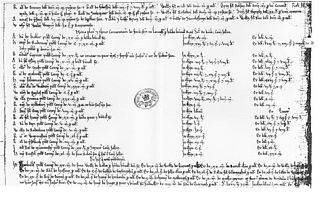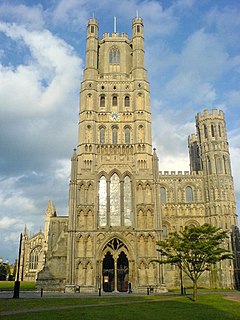Related Research Articles

Hubert Walter was an influential royal adviser in the late twelfth and early thirteenth centuries in the positions of Chief Justiciar of England, Archbishop of Canterbury, and Lord Chancellor. As chancellor, Walter began the keeping of the Charter Roll, a record of all charters issued by the chancery. Walter was not noted for his holiness in life or learning, but historians have judged him one of the most outstanding government ministers in English history.
Robert Burnell was an English bishop who served as Lord Chancellor of England from 1274 to 1292. A native of Shropshire, he served as a minor royal official before entering into the service of Prince Edward, the future King Edward I of England. When Edward went on the Eighth Crusade in 1270, Burnell stayed in England to secure the prince's interests. He served as regent after the death of King Henry III of England while Edward was still on crusade. He was twice elected Archbishop of Canterbury, but his personal life—which included a long-term mistress who was rumoured to have borne him four sons—prevented his confirmation by the papacy. In 1275 Burnell was elected Bishop of Bath and Wells, after Edward had appointed him Lord Chancellor in 1274.
Scutage is a medieval English tax levied on holders of a knight's fee under the feudal land tenure of knight-service. Under feudalism the king, through his vassals, provided land to knights for their support. The knights owed the king military service in return. The knights were allowed to "buy out" of the military service by paying scutage. As time passed the kings began to impose a scutage on holders of knight's fees, whether or not the holder was actually a knight.
Sir Bertram de Criol was a senior and trusted Steward and diplomat to King Henry III. He served as Constable and Keeper of Dover Castle, Keeper of the Coast and of the Cinque Ports, Keeper of the receipts, expenses and wardships of the archbishopric of Canterbury, Constable of the Tower of London and Sheriff of Kent.

Nicholas de Crioll, of a family seated in Kent, was Constable of Dover Castle and Keeper of the Coast during the early 1260s. His kinsman Bertram de Criol had distinguished himself in these offices during the preceding 20 years and both were near predecessors of the eminent Warden of the Cinque Ports, Stephen de Pencester.

The Pipe rolls, sometimes called the Great rolls, or the Great Rolls of the Pipe are a collection of financial records maintained by the English Exchequer, or Treasury, and its successors. The earliest date from the 12th century, and the series extends, mostly complete, from then until 1833. They form the oldest continuous series of records concerning English governance kept by the English, British and United Kingdom governments, covering a span of about 700 years. The early medieval ones are especially useful for historical study, as they are some of the earliest financial records available from the Middle Ages. A similar set of records was developed for Normandy, which was ruled by the English kings from 1066 to 1205, but the Norman Pipe rolls have not survived in a continuous series like the English.

Fulk FitzWarin, variant spellings, the third, was a prominent representative of a marcher family associated especially with estates in Shropshire and at Alveston in Gloucestershire. In young life, early in the reign of King John (1199–1216), he won notoriety as the outlawed leader of a roving force striving to recover his familial right to Whittington Castle in Shropshire, which John had granted away to a Welsh claimant. Progressively rehabilitated, and enjoying his lordship, he endured further setbacks in 1215–1217.
Letters close are a type of obsolete legal document once used by the Pope, the British monarchy and by certain officers of government, which is a sealed letter granting a right, monopoly, title, or status to an individual or to some entity such as a corporation. These letters were personal in nature, and were delivered folded and sealed, so that only the recipient could read their contents. This type of letter contrasts with the better-known letters patent.
In medieval England, Wales and the Channel Islands a licence to crenellate granted the holder permission to fortify his property. Such licences were granted by the king, and by the rulers of the counties palatine within their jurisdictions, i.e. by the Bishops of Durham, the Earls of Chester, and after 1351 by the Dukes of Lancaster.

Nigel was an Anglo-Norman Bishop of Ely. He came from an ecclesiastical family; his uncle Roger of Salisbury was a bishop and government minister for King Henry I, and other relatives also held offices in the English Church and government. Nigel owed his advancement to his uncle, as did Nigel's probable brother Alexander, who like Nigel was advanced to episcopal status. Nigel was educated on the continent before becoming a royal administrator. He served as Treasurer of England under King Henry, before being appointed to the see, or bishopric, of Ely in 1133. His tenure was marked by conflicts with the monks of his cathedral chapter, who believed that Nigel kept income for himself that should properly have gone to them.
The patent rolls are a series of administrative records compiled in the English, British and United Kingdom Chancery, running from 1201 to the present day.
Richard de Capella or Richard of the Chapel was a medieval Bishop of Hereford.
Carucage was a medieval English land tax enacted by King Richard I in 1194, based on the size—variously calculated—of the taxpayer's estate. It was a replacement for the danegeld, last imposed in 1162, which had become difficult to collect because of an increasing number of exemptions. Carucage was levied just six times: by Richard in 1194 and 1198; John, his brother and successor, in 1200; and John's son, Henry III, in 1217, 1220, and 1224, after which it was replaced by taxes on income and personal property.
The Close Rolls are an administrative record created in medieval England, Wales, Ireland and the Channel Islands by the royal chancery, in order to preserve a central record of all letters close issued by the chancery in the name of the Crown.
A chancery or chancellery is a medieval writing office, responsible for the production of official documents. The title of chancellor, for the head of the office, came to be held by important ministers in a number of states, and remains the title of the heads of government in modern Germany and Austria. Chancery hand is a term for various types of handwriting associated with chanceries.
A statute roll is a manuscript parchment roll with the text of statutes passed by the medieval Parliament of England. The statute rolls are also called Tower rolls since they were kept in the Wakefield Tower of the Tower of London until the 1850s.

Butley Priory, sometimes called Butley Abbey, was a religious house of Canons regular in Butley, Suffolk, dedicated to The Blessed Virgin Mary. It was founded in 1171 by Ranulf de Glanville, Chief Justiciar to King Henry II (1180-1189), and was the sister foundation to Ranulf's house of White canons (Premonstratensians) at Leiston Abbey, a few miles to the north, founded c. 1183. Butley Priory was suppressed in 1538.
The Record Commissions were a series of six Royal Commissions of Great Britain and the United Kingdom which sat between 1800 and 1837 to inquire into the custody and public accessibility of the state archives. The Commissioners' work paved the way for the establishment of the Public Record Office in 1838. The Commissioners were also responsible for publishing various historical records, including the Statutes of the Realm to 1714 and the Acts of Parliament of Scotland to 1707, as well as a number of important medieval records.
The Treaty of Louviers was a peace agreement signed between King Richard I of England and King Philip II of France in the early part of January 1196 concerning, among other things, the manors of Andeli and Louviers that at the time were parcels of land of significance in Normandy. It aimed to settle the claims the Angevin kings of England had on French lands and, at least temporarily, to end the quarreling over the Duchy of Normandy.
References
- Sayles, G. O. (1967). The Medieval Foundations of England. London.
- Chrimes, S. B. (1966). An Introduction to the Administrative History of Mediaeval England (third ed.). Oxford, UK: Basil Blackwell. OCLC 270094959.
- Saul, Nigel (2000). A Companion to Medieval England 1066–1485. Stroud: Tempus. ISBN 0-7524-2969-8.
- Bury, J. B. (1929). The Cambridge Medieval History . Vol. VI. Cambridge University Press.